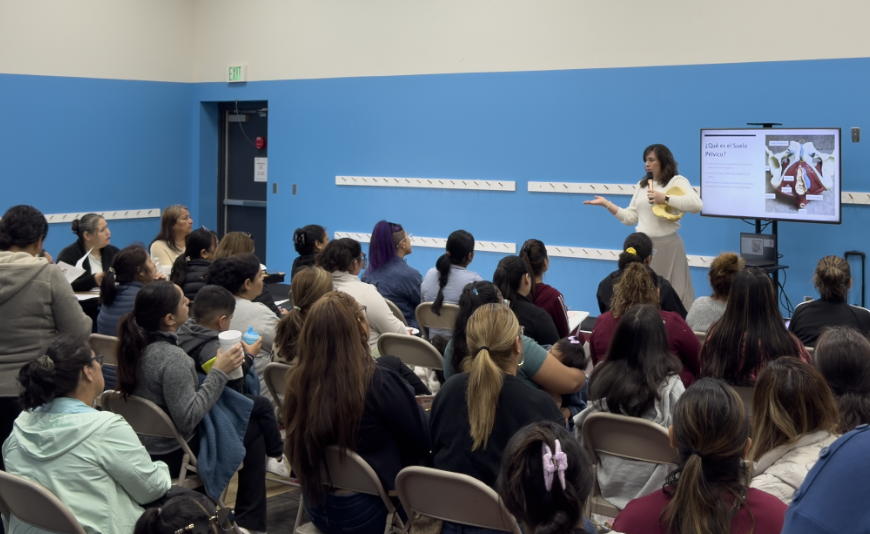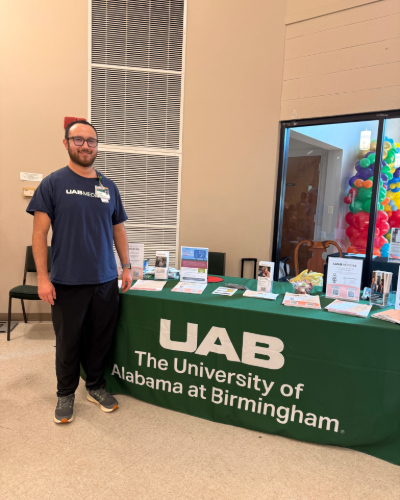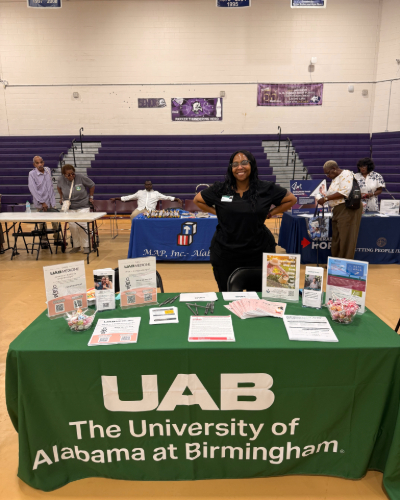 Over the past six months, the Division of Urogynecology and Reconstructive Pelvic Surgery at UAB has taken meaningful steps to expand access to care for all communities in Alabama. Because of their creative outreach efforts, they have seen a 50% increase in the number of Latina patients seen at their clinics.
Over the past six months, the Division of Urogynecology and Reconstructive Pelvic Surgery at UAB has taken meaningful steps to expand access to care for all communities in Alabama. Because of their creative outreach efforts, they have seen a 50% increase in the number of Latina patients seen at their clinics.
Gabriela Halder, M.D., MPH, an assistant professor in the division who spearheaded the initiative, elaborated on the team’s approach to community engagement, its impact so far, and its plans for the future.
Q: What sparked the idea for this type of outreach?
Dr. Halder:
We wanted to reach communities that don’t routinely seek urogynecologic care. Many women in Alabama may be living with pelvic floor disorders but aren’t aware that safe and effective treatments exist, or don’t know where to find them. Our ongoing research grants gave us an opportunity to put resources toward continuous outreach, so we made it a priority.
By going directly into communities, attending events, and using trusted platforms like Spanish-language radio, we’re not waiting for patients to find us. We’re meeting them where they are.
Q: How do these efforts align with the broader goals of the Urogynecology division?
Dr. Halder:
Our division has always had a mission of expanding access. We see patients not only from Birmingham but from across Alabama and even neighboring southern states. These outreach efforts help ensure that everyone, regardless of background or language, knows that specialized care is available.
Q: What impact do you hope to achieve by engaging with the community in this way?
Dr. Halder:
Our biggest goal is awareness. Many women suffer in silence because they think urinary incontinence, prolapse, or other pelvic floor conditions are just a “normal” part of aging or childbirth. By showing up at health fairs, community events, and on the radio, we can break down those barriers and normalize talking about these issues.
We’ve also noticed that as our presence grows, organizations are reaching out to us directly. That’s a powerful sign that the community sees us as a trusted partner.
Q: Did any potential collaborations emerge from your conversations with local organizations?
Dr. Halder:
Yes, absolutely. We have connected with community leaders who are eager to collaborate in the future. Building these relationships is key; we want to keep partnering with groups that already have deep roots in their communities.
Q: Are there plans to expand or repeat these types of outreach efforts?
Dr. Halder:
Definitely. We plan to keep attending fairs, health talks, and other local events, while also seeking new organizations to partner with. Outreach isn’t a one-time thing.
Q: How does your team follow up with individuals who express interest or share their information?
Dr. Halder:
We always bring sign-up sheets and clinic contact information to events. If someone wants an appointment, our scheduler follows up and gets them on the calendar. For those not ready to schedule, we make sure they have brochures and direct ways to reach us when they are. That way, no one feels like their interest was left unanswered.
Q: What advice would you give to other healthcare teams looking to start similar initiatives?
Dr. Halder:
First and foremost, invest in staff who are passionate about community work. Engagement isn’t just about showing up. It’s about building relationships, trust, and credibility over time.
It also requires patience. You can’t expect immediate results. But if you show up consistently, listen to people’s needs, and follow through, the community will start to see you as a reliable partner in their health.
 Beyond outreach
Beyond outreach
In addition to community events, Halder has been a vocal advocate for pelvic health through media appearances. She has completed multiple interviews on La Jefa, Alabama’s leading Spanish-language radio station, where she discussed pelvic floor disorders and encouraged women to seek care. She also joined a podcast with the Journal of Minimally Invasive Gynecology to discuss her published research on vaginal hysterectomy, and collaborated with FORGE, a Birmingham-based breast cancer survivor group, to raise awareness through social media.
 The Urogynecology team’s outreach is already proving to be beneficial, with more patients accessing care and community organizations requesting continued partnerships. What began as a way to share health information is evolving into a long-term effort to ensure that all women in Alabama have access to specialized urogynecologic care.
The Urogynecology team’s outreach is already proving to be beneficial, with more patients accessing care and community organizations requesting continued partnerships. What began as a way to share health information is evolving into a long-term effort to ensure that all women in Alabama have access to specialized urogynecologic care.
Dr. Halder sums it up best:
“Community engagement requires relationships, commitment, and trust. It takes time, but when women feel seen, heard, and supported, the impact can be life-changing.